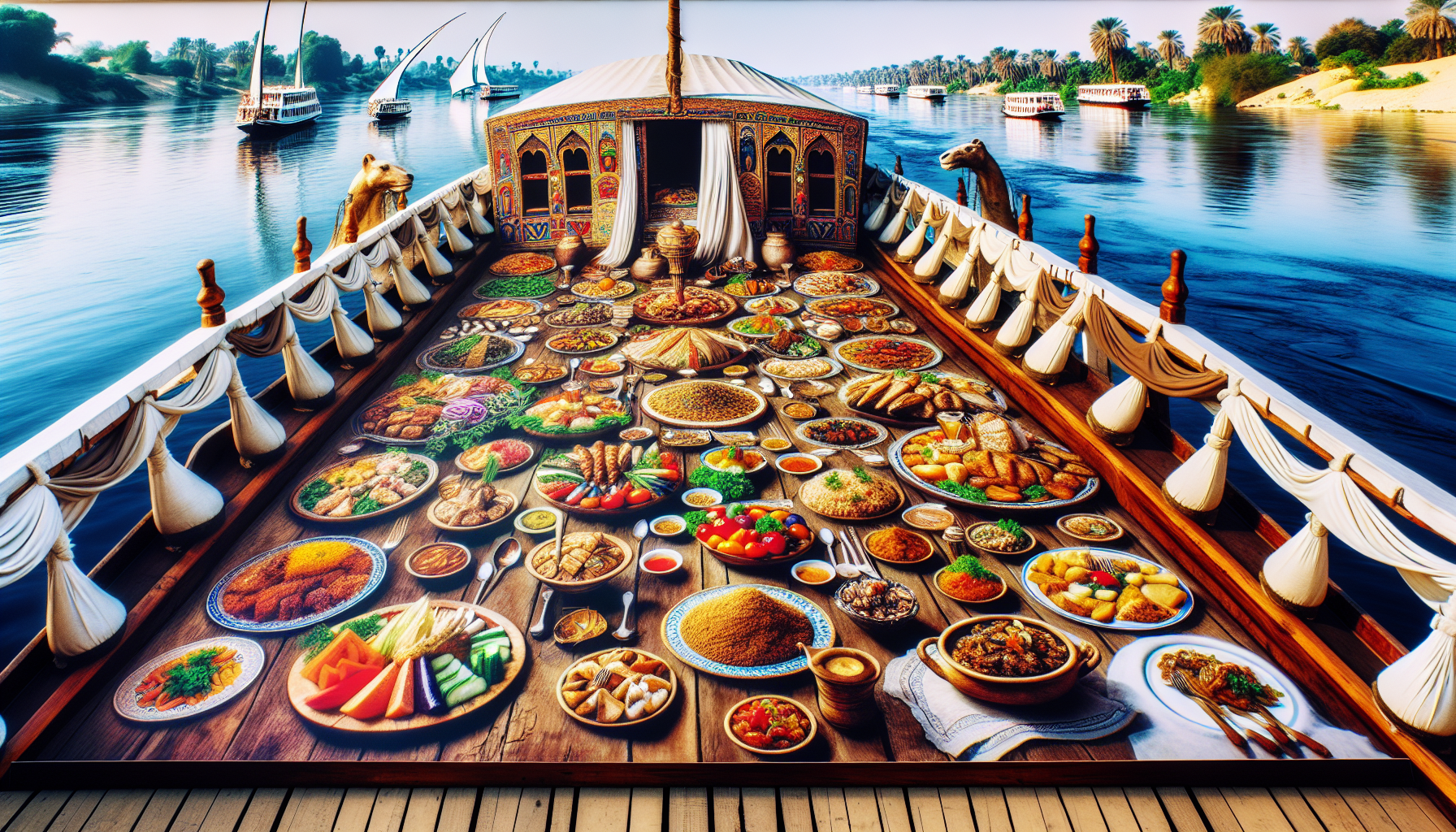In the video titled “Delicious Egyptian Cuisine on the Dahabaya,” Lost LeBlanc and his friends take viewers on a 5-day sailing trip down the Nile River from Luxor to Aswan. They document their journey on a private boat called a dahabaya, which offers stunning views from its large upper deck and comfortable bedrooms below. At a cost of about $1000 per person, the trip includes all meals, temple stops, and tour guides. The group explores famous temples like the Edfu Temple, visits local markets (including a camel market), enjoys mouthwatering Egyptian cuisine prepared by the boat’s chef, and immerses themselves in the vibrant culture and language of Nubia. The video concludes with a recommendation to visit Egypt and highlights the unique experience of cruising the Nile River.
Delicious Egyptian Cuisine on the Dahabaya
The video takes us on a 5-day sailing trip down the Nile River from Luxor to Aswan, and one of the highlights of the trip is the delicious Egyptian cuisine served on the dahabaya. The dahabaya is a private boat with a large upper deck and cozy bedrooms below, and it provides the perfect setting for exploring Egyptian food and culture.
Exploring Egyptian Food on the Dahabaya
Egyptian cuisine is diverse, flavorful, and full of rich and vibrant flavors. During the trip, the travelers had the opportunity to try a variety of traditional Egyptian dishes prepared by the boat’s talented chef. From breakfast to dinner, they indulged in the unique flavors and aromas of Egyptian cuisine.
Traditional Egyptian Dishes
Egyptian cuisine is known for its diverse range of dishes, and the travelers on the dahabaya had the chance to try some of the best of them. From classic dishes like koshary and ful medames to popular street food like falafel and taameya, they were able to experience the authentic flavors of Egypt. Each dish was packed with spices, herbs, and local ingredients that created a delightful explosion of flavors in their mouths.
Egyptian Breakfast on Board
Breakfast on the dahabaya was a feast for the senses. The travelers woke up to the aroma of freshly brewed coffee and the tantalizing smell of freshly baked bread. Traditional Egyptian breakfast dishes like ful medames, a bean dish topped with olive oil and served with pita bread, and taameya, an Egyptian version of falafel made with fava beans, were served. They also enjoyed fresh fruits, yogurt, and local Egyptian cheeses.
Lunch and Dinner Delights
Lunch and dinner on the dahabaya were always a culinary adventure. The chef prepared a variety of dishes that showcased the best of Egyptian cuisine. From savory rice-based dishes like koshary and stuffed vegetables to mouthwatering grilled meats and fish, there was something to satisfy every palate. The travelers were also introduced to Egyptian staples like tahini, a sesame seed paste, and molokhia, a traditional Egyptian soup made from jute leaves.
Exceptional Desserts and Snacks
No meal is complete without dessert, and the dahabaya did not disappoint. The travelers indulged in a variety of Egyptian sweets and snacks that left them wanting more. They enjoyed traditional treats like basbousa, a sweet semolina cake soaked in syrup, and konafa, a pastry made with shredded phyllo dough filled with nuts and drizzled with syrup. They also savored traditional Egyptian snacks like roasted nuts, dried fruits, and kahk, a sweet biscuit enjoyed during festive occasions.
Local Ingredients and Flavors
What made the Egyptian cuisine on the dahabaya truly special was the use of local ingredients and flavors. The chef sourced fresh produce, spices, and herbs from local markets, ensuring that each dish was bursting with authentic Egyptian flavors. From aromatic herbs like mint and parsley to flavorful spices like cumin, coriander, and cinnamon, the use of local ingredients truly elevated the dining experience on board.
Egyptian Food Culture and Customs
It is not just the food itself that makes Egyptian cuisine so fascinating, but also the food culture and customs that surround it. The travelers had the chance to learn about the importance of food in Egyptian culture and the customs and traditions associated with it. They learned about the significance of communal dining, the use of bread to scoop up food, and the importance of hospitality in Egyptian culture.
Experiencing the Vibrant Egyptian Streets
While the food on the dahabaya was exceptional, the travelers also got to experience the vibrant food scene in the towns they visited. They explored local markets, sampled street food, and interacted with local vendors. They visited a camel market and witnessed the hustle and bustle of the streets, immersing themselves in the everyday life of Egypt.
Exploring Nubian Culture and Cuisine
The travelers also had the opportunity to explore Nubian culture and cuisine during their trip. They learned about the unique history and traditions of the Nubian people, and enjoyed Nubian dishes that showcased the flavors and ingredients of the region. From traditional dishes like Assida, a porridge-like dish made from sorghum flour, to refreshing drinks like hibiscus tea, they experienced the richness of Nubian cuisine.
Conclusion: A Memorable Culinary Journey
The trip down the Nile River on the dahabaya was truly a memorable culinary journey. The travelers had the opportunity to explore Egyptian food culture, try traditional dishes, and experience the vibrant food scene in the towns they visited. From breakfast to dinner and everything in between, the flavors and aromas of Egyptian cuisine transported them to a world of culinary delights. Whether it was savoring the authentic flavors of Egyptian dishes on board or sampling street food in local markets, this journey was a feast for the senses. As the trip came to an end, the travelers were left with unforgettable memories and a deep appreciation for the delicious Egyptian cuisine they had experienced.
